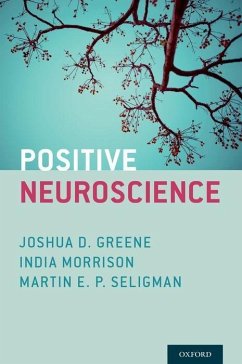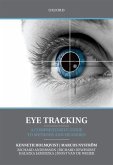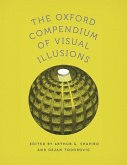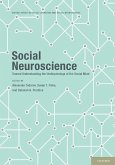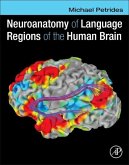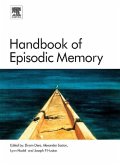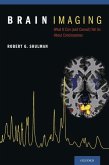Positive Neuroscience
Herausgeber: Greene, Joshua D; Seligman, Martin E P; Morrison, India
Positive Neuroscience
Herausgeber: Greene, Joshua D; Seligman, Martin E P; Morrison, India
- Gebundenes Buch
- Merkliste
- Auf die Merkliste
- Bewerten Bewerten
- Teilen
- Produkt teilen
- Produkterinnerung
- Produkterinnerung
This volume describes research supported by the John Templeton Foundation's Positive Neuroscience Project, aimed at illuminating the neural mechanisms that promote human flourishing. Topics include social bonds, altruism, creativity, and resilience.
Andere Kunden interessierten sich auch für
![Eye Tracking Eye Tracking]() Kenneth HolmqvistEye Tracking200,99 €
Kenneth HolmqvistEye Tracking200,99 €![Neuroethics of Biomarkers Neuroethics of Biomarkers]() Matthew L BaumNeuroethics of Biomarkers92,99 €
Matthew L BaumNeuroethics of Biomarkers92,99 €![Oxf Compendium Visual Illusions C Oxf Compendium Visual Illusions C]() Oxf Compendium Visual Illusions C389,99 €
Oxf Compendium Visual Illusions C389,99 €![Social Neuroscience Social Neuroscience]() Social Neuroscience189,99 €
Social Neuroscience189,99 €![Neuroanatomy of Language Regions of the Human Brain Neuroanatomy of Language Regions of the Human Brain]() Michael PetridesNeuroanatomy of Language Regions of the Human Brain137,99 €
Michael PetridesNeuroanatomy of Language Regions of the Human Brain137,99 €![Handbook of Episodic Memory Handbook of Episodic Memory]() Handbook of Episodic Memory182,99 €
Handbook of Episodic Memory182,99 €![Brain Imaging Brain Imaging]() Robert G ShulmanBrain Imaging108,99 €
Robert G ShulmanBrain Imaging108,99 €-
-
-
This volume describes research supported by the John Templeton Foundation's Positive Neuroscience Project, aimed at illuminating the neural mechanisms that promote human flourishing. Topics include social bonds, altruism, creativity, and resilience.
Produktdetails
- Produktdetails
- Verlag: Hurst & Co.
- Seitenzahl: 256
- Erscheinungstermin: 7. Juni 2016
- Englisch
- Abmessung: 240mm x 160mm x 20mm
- Gewicht: 514g
- ISBN-13: 9780199977925
- ISBN-10: 0199977925
- Artikelnr.: 47870456
- Herstellerkennzeichnung
- Libri GmbH
- Europaallee 1
- 36244 Bad Hersfeld
- gpsr@libri.de
- Verlag: Hurst & Co.
- Seitenzahl: 256
- Erscheinungstermin: 7. Juni 2016
- Englisch
- Abmessung: 240mm x 160mm x 20mm
- Gewicht: 514g
- ISBN-13: 9780199977925
- ISBN-10: 0199977925
- Artikelnr.: 47870456
- Herstellerkennzeichnung
- Libri GmbH
- Europaallee 1
- 36244 Bad Hersfeld
- gpsr@libri.de
Joshua D. Greene, PhD, is Professor of Psychology, a member of the Center for Brain Science faculty, and the director of the Moral Cognition Lab at Harvard University. India Morrison, PhD, is Assistant Professor in the Department of Clinical and Experimental Medicine at Linköping University, Sweden, and co-founder of the Group for Research in Affective Somatosensation and Pain (GRASP). Martin E.P. Seligman, PhD, is Director of the Penn Positive Psychology Center and Zellerbach Family Professor of Psychology in the Penn Department of Psychology, and Director of the Penn Master of Applied Positive Psychology program (MAPP).
* Contributors
* Introducing Positive Neuroscience
* Joshua D. Greene and India Morrison
* Part I: Social Bonds
* 1. Affective and Social Touch
* India Morrison
* 2. The Neural Correlates of Individual Variation in Paternal
Nurturance
* James K. Rilling and Jennifer Mascaro
* 3. Toward a Neuroscience of Social Resonance
* Thalia Wheatley and Beau Sievers
* Part II: Altruism
* 4. Prosociality as a form of reward-seeking
* Jamil Zaki and Jason Mitchell
* 5. Is Human Prosocial Behavior Unique?: Insights and New Questions
from Non-Human Primates
* Lindsey Drayton and Laurie Santos
* 6. When Feeling and Doing Diverge: Neural and physiological
correlates of the empathy-altruism divide
* Tony W. Buchanan and Stephanie D. Preston
* 7. Amygdala Tuning Toward Self and Other
* Vincent Man, Daniel L. Ames, Alexander Todorov, and William A.
Cunningham
* 8. Towards a Neuroscience of Compassion: A brain systems-based model
and research agenda
* Yoni K. Ashar, Jessica Andrews-Hanna, Tor D. Wager, and Sona
Dimidjian
* 9. Extraordinary Altruism: A Cognitive Neuroscience Perspective
* Abigail Marsh
* Part III: Resilience and Creativity
* 10. Increasing Positive Emotion in Negative Contexts: Emotional
Consequences, Neural Correlates, and Implications for Resilience
* Kateri McRae and Iris Mauss
* 11. Could Meditation Modulate the Neurobiology of Learning Not to
Fear?
* Britta Hölzel, Sara W. Lazar, and Mohammed Milad
* 12. The Role of Brain Connectivity in Musical Experience
* Psyche Loui
* 13. The Function of Positive Emotions in Exploration
* Hans Melo and Adam Anderson
* Index
* Introducing Positive Neuroscience
* Joshua D. Greene and India Morrison
* Part I: Social Bonds
* 1. Affective and Social Touch
* India Morrison
* 2. The Neural Correlates of Individual Variation in Paternal
Nurturance
* James K. Rilling and Jennifer Mascaro
* 3. Toward a Neuroscience of Social Resonance
* Thalia Wheatley and Beau Sievers
* Part II: Altruism
* 4. Prosociality as a form of reward-seeking
* Jamil Zaki and Jason Mitchell
* 5. Is Human Prosocial Behavior Unique?: Insights and New Questions
from Non-Human Primates
* Lindsey Drayton and Laurie Santos
* 6. When Feeling and Doing Diverge: Neural and physiological
correlates of the empathy-altruism divide
* Tony W. Buchanan and Stephanie D. Preston
* 7. Amygdala Tuning Toward Self and Other
* Vincent Man, Daniel L. Ames, Alexander Todorov, and William A.
Cunningham
* 8. Towards a Neuroscience of Compassion: A brain systems-based model
and research agenda
* Yoni K. Ashar, Jessica Andrews-Hanna, Tor D. Wager, and Sona
Dimidjian
* 9. Extraordinary Altruism: A Cognitive Neuroscience Perspective
* Abigail Marsh
* Part III: Resilience and Creativity
* 10. Increasing Positive Emotion in Negative Contexts: Emotional
Consequences, Neural Correlates, and Implications for Resilience
* Kateri McRae and Iris Mauss
* 11. Could Meditation Modulate the Neurobiology of Learning Not to
Fear?
* Britta Hölzel, Sara W. Lazar, and Mohammed Milad
* 12. The Role of Brain Connectivity in Musical Experience
* Psyche Loui
* 13. The Function of Positive Emotions in Exploration
* Hans Melo and Adam Anderson
* Index
* Contributors
* Introducing Positive Neuroscience
* Joshua D. Greene and India Morrison
* Part I: Social Bonds
* 1. Affective and Social Touch
* India Morrison
* 2. The Neural Correlates of Individual Variation in Paternal
Nurturance
* James K. Rilling and Jennifer Mascaro
* 3. Toward a Neuroscience of Social Resonance
* Thalia Wheatley and Beau Sievers
* Part II: Altruism
* 4. Prosociality as a form of reward-seeking
* Jamil Zaki and Jason Mitchell
* 5. Is Human Prosocial Behavior Unique?: Insights and New Questions
from Non-Human Primates
* Lindsey Drayton and Laurie Santos
* 6. When Feeling and Doing Diverge: Neural and physiological
correlates of the empathy-altruism divide
* Tony W. Buchanan and Stephanie D. Preston
* 7. Amygdala Tuning Toward Self and Other
* Vincent Man, Daniel L. Ames, Alexander Todorov, and William A.
Cunningham
* 8. Towards a Neuroscience of Compassion: A brain systems-based model
and research agenda
* Yoni K. Ashar, Jessica Andrews-Hanna, Tor D. Wager, and Sona
Dimidjian
* 9. Extraordinary Altruism: A Cognitive Neuroscience Perspective
* Abigail Marsh
* Part III: Resilience and Creativity
* 10. Increasing Positive Emotion in Negative Contexts: Emotional
Consequences, Neural Correlates, and Implications for Resilience
* Kateri McRae and Iris Mauss
* 11. Could Meditation Modulate the Neurobiology of Learning Not to
Fear?
* Britta Hölzel, Sara W. Lazar, and Mohammed Milad
* 12. The Role of Brain Connectivity in Musical Experience
* Psyche Loui
* 13. The Function of Positive Emotions in Exploration
* Hans Melo and Adam Anderson
* Index
* Introducing Positive Neuroscience
* Joshua D. Greene and India Morrison
* Part I: Social Bonds
* 1. Affective and Social Touch
* India Morrison
* 2. The Neural Correlates of Individual Variation in Paternal
Nurturance
* James K. Rilling and Jennifer Mascaro
* 3. Toward a Neuroscience of Social Resonance
* Thalia Wheatley and Beau Sievers
* Part II: Altruism
* 4. Prosociality as a form of reward-seeking
* Jamil Zaki and Jason Mitchell
* 5. Is Human Prosocial Behavior Unique?: Insights and New Questions
from Non-Human Primates
* Lindsey Drayton and Laurie Santos
* 6. When Feeling and Doing Diverge: Neural and physiological
correlates of the empathy-altruism divide
* Tony W. Buchanan and Stephanie D. Preston
* 7. Amygdala Tuning Toward Self and Other
* Vincent Man, Daniel L. Ames, Alexander Todorov, and William A.
Cunningham
* 8. Towards a Neuroscience of Compassion: A brain systems-based model
and research agenda
* Yoni K. Ashar, Jessica Andrews-Hanna, Tor D. Wager, and Sona
Dimidjian
* 9. Extraordinary Altruism: A Cognitive Neuroscience Perspective
* Abigail Marsh
* Part III: Resilience and Creativity
* 10. Increasing Positive Emotion in Negative Contexts: Emotional
Consequences, Neural Correlates, and Implications for Resilience
* Kateri McRae and Iris Mauss
* 11. Could Meditation Modulate the Neurobiology of Learning Not to
Fear?
* Britta Hölzel, Sara W. Lazar, and Mohammed Milad
* 12. The Role of Brain Connectivity in Musical Experience
* Psyche Loui
* 13. The Function of Positive Emotions in Exploration
* Hans Melo and Adam Anderson
* Index

